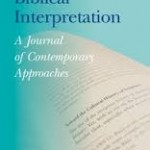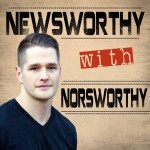 Today’s post is part of our continuing yet intermittent “aha” moment series, this from Jared Byas.
Today’s post is part of our continuing yet intermittent “aha” moment series, this from Jared Byas.
Byas (BA in Philosophy from Liberty University and an MAR from Westminster Theological Seminary) was in pastoral ministry from 2004 until 2011. He then left to teach Philosophy & Ethics at Grand Canyon University and co-launch MyOhai, a collective of creatives and advisers (that he now runs under the name EMDASH) where he advises individuals and organizations on how to communicate better. In 2012 he co-wrote Genesis for Normal People with me and in 2013 he became the founding operations director for Experience Institute, an innovative graduate school alternative based in Chicago.
Byas and his wife Sarah live in suburban Philadelphia and have four children: Augustine (6), Tov (5), Elletheia (3), & Exodus (1).
**************
Some teenagers dream of being musicians or sports stars. My dream was seminary — and becoming a Christian apologist. So, after receiving a B.A. in philosophy at a self-described conservative Christian university my new wife and I moved states for me to live the dream.
Little did I know the dream would include lying awake for countless nights alternating between intense fear that I might go to hell for changing my views about the Bible and giddy excitement, like I had just opened the Bible again for the first time.
Just like many in this series, my “aha” moments concerning the Bible came from actually studying it in my seminary Bible classes and followed Thomas Kuhn’s description of paradigm shift perfectly: minor shifts that over time forced a new framework for understanding the whole.
But a few of those shifts were more memorable than others.
The first was discovering the work of Walter Brueggemann. His Texts Under Negotiation and Prophetic Imagination reminded me of a quote by the great jazz saxophonist Charlie Parker, “Master your instrument, master the music, and then forget that shit and just play.”
When Brueggemann could quote the latest scholarship and garner the respect of the academy while also penning phrases like,
Thus every totalitarian regime is frightened of the artist. It is the vocation of the prophet to keep alive the ministry of imagination, to keep on conjuring and proposing futures alternative to the single one the king wants to urge as the only thinkable one, (Prophetic Imagination, 40)
it was evident that he was engaged in playful mastery.
His writings asked that I stop trying to make the Bible “relevant” (an important phrase in my tradition), whether it be to culture, contemporary church polity, or theology, and instead immerse myself with such abandon that I became relevant to the text.
He showed me that scholarship coupled with deep imagination is the heart of the theological enterprise; that is, he modeled for me the responsibility of pursuing biblical scholarship beyond my own ideological idols and gave me the permission to do it with imagination and passion.
And he let me know it probably wouldn’t be well received by those in power.
My second memorable “aha” moment was my interaction with Jon Levenson, professor of Jewish Studies at Harvard. After reading his entire corpus and exchanging emails with him for a graduate seminar on Old Testament Theology I felt like I had gone through rehab and boot camp, all in one semester.
Like Brueggemann, Levenson continued to indulge my fascination with “playful mastery.” But Brueggemann, though he had given me the courage to chart a different course, hadn’t really given me any maps. Through his sharp analyses of biblical conflict, tension, and contradiction, Levenson was my map.
Levenson effortlessly quotes biblical and rabbinic texts to animate the conflict within the traditions behind the Hebrew Bible in Sinai & Zion. He creatively interrogates how Deuteronomy and the Holiness Code (Leviticus 17–26) may point to a cover-up about child sacrifice in The Death and Resurrection of the Beloved Son.
And he does it all with an evident passion and respect for the text that avoids both religious eisegesis and dismissive antagonism.
I came to seminary with an protectionist Calvinist orientation, and chose my seminary for that reason. But I came to see that Levenson and Brueggemann took the Bible more seriously than I or my tradition did—or anyone I had read before—and it led them to dangerously refreshing and compelling conclusions.
Their tenacious sincerity about the text wasn’t a means to defending already existing dogmas but a means to understanding, and beyond that, imagination. That was new for me. And I was hooked.
In full disclosure, those months were difficult for me. During this time, I was a teaching pastor and was constantly wrestling with how these “aha” moments would affect my congregation, and, to be honest, my paycheck. They were also hard on my wife, who noticed a change in me. One morning she finally said, “I feel like you’ve lost your convictions about Christianity. What’s going on?”
That stung. I had always prided myself on being a person of conviction. But she was right. And she was also wrong.
I said, “If you mean my convictions about how to read the Bible, then yes. But if you mean my love for the Bible itself, then no. I think I’ve just now found it.” That was enough for her. And thankfully we’ve been on a beautiful journey of faith together ever since.












